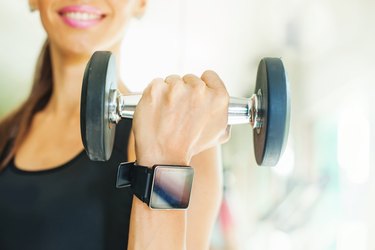
Whether you exercise with the intention of burning fat or gaining muscle, it's impossible to overlook the benefits of exercise on your heart. When you strengthen your heart by exercising, you improve the health of this organ and limit your risk of heart disease. Maximizing your workout means raising your heart rate to within a specific zone, but not exceeding it.
Increased Intensity Equals Increased Heart Rate
Video of the Day
One of the first things you'll notice upon starting a cardiovascular exercise, such as running, swimming or jumping rope, is an increase in your heart rate. Your heart must beat faster during exercise so it can supply your body with oxygen to sustain the activity. Its increased rate strengthens the heart itself, but you must take care to avoid raising your heart rate to an unhealthy level. To do so, you must understand your maximum heart rate and target heart rate.
Video of the Day
Start With Your Maximum Heart Rate
Before you endeavor to keep your heart rate inside its target range as you exercise, you must calculate that range. To do so, first determine your maximum heart rate, which fluctuates according to your age. You can find your maximum heart rate by subtracting your age from the number 220. If you're 45 years of age, for example, you shouldn't elevate your heart rate to more than 175 beats per minute while exercising.
Getting in the Zone
Once you've calculated the maximum heart rate for your age, you can proceed to figuring out your target heart-rate zone. According to the Cleveland Clinic, your target heart rate zone is between 60 and 85 percent of your maximum rate. Therefore, if you're 45 years old and have a maximum heart rate of 175 beats per minute, your heart should beat between 105 and 149 beats per minute while you exercise.
Prepare for a Rise or Fall
A variety of factors can cause a rise or fall in your heart rate during exercise. Knowing these factors allows you to adjust your workout intensity to remain in your target zone. Hot weather can cause a spike in your heart rate, as can obesity and thyroid medication. Beta blockers, meanwhile, can cause a decrease in your heart rate. Certain body positions and especially a quick change in the position of your body can result in a temporary heart rate change.
- University of California San Francisco: Heart Health Benefits of Physical Activity
- Cleveland Clinic: Pulse and Target Heart Rate
- American Heart Association: All About Heart Rate (Pulse)
- Human Kinetics: Improve Your Endurance by Knowing What Affects Your Heart Rate
- University of Maryland Medical Center: Exercise
- American Heart Association: Target Heart Rates
- The New York Times: Exercise's Effects on the Heart